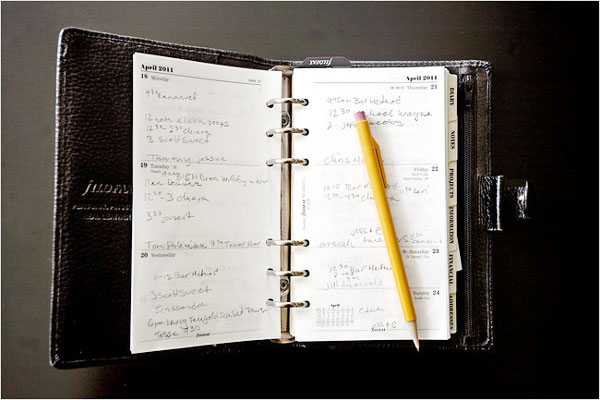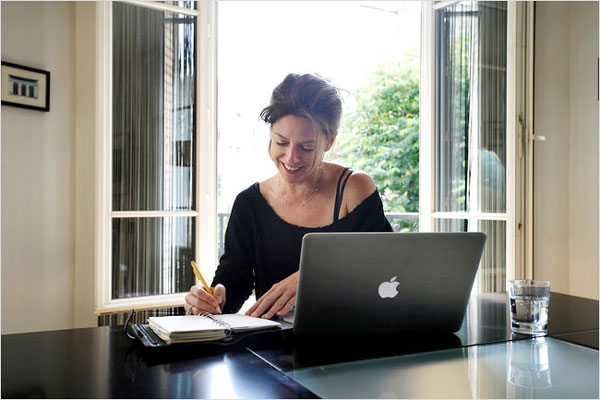A paper calendar? It's 2011
 |
|
[Photo/The New York Times] |
 |
|
[Photo/The New York Times] |
Last month, I did something that not once in my 20 years as an overscheduled, neurotically punctual, paper-bound calendar keeper had I done before: I left my personal organizer (as Filofaxes, Day Runners and such are known to the trade) at the office.
Not only that, I forgot it there on a Friday, leaving me clueless and unmoored for an entire weekend. What was I supposed to do on Saturday? What were my children supposed to do? Were birthday parties left unattended, errands unrun? On Sunday night, deprived of my ritual week-ahead review, I had nothing to worry about except what I didn't know I should be worrying about.
This sorry situation had, of course, a solution, one embraced by many: convert to iCal, Google Calendar, Outlook or any number of other electronic personal-information management systems (as they are known to the trade). You can instantly update. You can sync. You can seamlessly integrate personal and professional into a harmoniously unified oneness.
I would rather live a life of 1,000 missed appointments.
So much of our social and professional lives are determined by the systems we use to keep track of them. With more people converting to electronic calendars or hovering between paper and PDA, how we construct and coordinate our schedules is in flux. And no matter how synchronized our intertwined lives have become, a certain amount of calendar clashing is inevitable.
Electronic calendar users ("normal people," my husband calls them) can be dismissive of their paper forebears. "You lose a paper calendar and it's gone," said Ayelet Waldman, a novelist who syncs her iCal among her husband and five children with the zeal of the converted. The night of her wedding she lost her Filofax, and "It was so traumatizing that as soon as there was an electronic option, I switched over." Paper, she said, "is horse and buggy.
"I have a friend who's still on paper. I think it's silly."
"There's absolutely nothing anyone could say to get me to switch," said Dany Levy, founder of Daily Candy and a faithful Filofax keeper since high school. "People are shocked. Here I am a dot.com entrepreneur, I should be on the bleeding edge of hip technology, yet I use a form of scheduling that dates to the dinosaurs."
But according to "An Exploratory Study of Personal Calendar Use," a 2008 paper from Virginia Tech, the march of electronic calendaring is swift and inevitable: "With the increased use of mobile devices, more and more calendaring tasks are performed off the desktop computer."
Three years later, the study is already a relic, according to one of its authors, Manuel A. Perez-Quinones, an associate professor of computer science. "That was before smartphones, before Google calendar, back when you still had to plug in your PDA to sync," Dr. Perez-Quinones said. "It was a whole different monster." Paper hasn't totally disappeared, he said, "but the desk and office calendar is on its way out."
This kind of prediction strikes terror in paper people. Yet there isn't necessarily a correlation between a commitment to technology and a choice of calendar. "I've got an iPad, an iPod, I'm on Twitter and Facebook and I'm talking on my BlackBerry now," said Nelson George, a cultural critic, filmmaker and producer, in a phone interview. "But that's enough. I'm an old-school paper calendar person."
Mr. George uses a datebook that fits in his back pocket. "People make comments about it," he said. "They show me their little technology. But then they sit there tapping on their device, and by the time they've gone through all the log-ins and downloading, I've already flipped the page."
Though it may be counterintuitive (electronic calendar keepers insist their method is more reliable than the ephemera of paper), those who use a paper calendar see it as the more durable option. Mr. George has dropped his BlackBerry in water three times — something he believes wouldn't or couldn't threaten his notebook.
The fear of submerging an electronic calendar has a peculiar hold on the paper-ites. "Even if I dropped my agenda in the bath, I could still fish it out," Simon Doonan, creative ambassador at large for Barneys, said in defense of his yellow Goyard, monogrammed in orange, gold, burgundy and blue. There's something inherently appealing about its physicality, he said. "I am always doodling and sketching and making insane little micro notes to myself."
Elizabeth Beier, executive editor at St. Martin's Press, has kept the same agenda since the mid-'80s, when she bought it in London at the Filofax boutique. "I have the standard size with a cover that used to be green and a handsome little snap that has since rotted off," she said. "I feel like it's lived with me so long that it's earned its decrepitude."






















